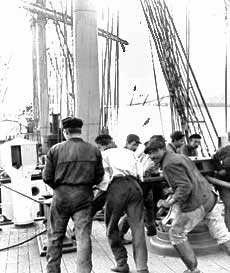It Isn't All Fun and Games Janet
Richard Henry Dana gives us his view of life as a common sailor when he signs on with an American merchant ship in his narrative Two Years Before The Mast. Dana’s engaging writing makes his ordeals seem to be more of an adventure rather than a cautionary warning, but his original intent was to cast an informative light upon the plight of Jack Tar in the early 1800’s – both the good and the bad. Incredibly harsh conditions and circumstances help Dana illustrate the more dreadful aspects of his experience.
The most brutal event witnessed by Dana was the flogging of his fellow sailors. The captain appeared to be at odds with everyone and everything, even quarreling with the cook. When the rather slow witted Sam did not respond to a question exactly as the captain demanded, he ordered Sam be seized up for a flogging. Dana was aghast at the idea of such brutality being afflicted upon another human being and watched as another sailor was flogged as well. “Disgusted, sick, and horror-struck, I turned away and leaned over the rail, and looked down into the water (114).” Later that night, Dana contemplates the actions of the captain and vows to himself that if he is ever able, he will address the injustices and relieve the suffering of this particular class of beings.
Not all of the suffering came directly from the captain. Mother Nature worked with the captain to inflict intolerable conditions on the crew who had been assigned to wood gathering duty. Dana, being one of the youngest, was assigned this cold and wet task of loading the skiff “and there we were, with frost on the ground, wading forward and back, from the beach to the boat, with arms full of wood, barefooted, and our trowsers rolled up (247).” To keep their feet from freezing while the skiff deposited their load of wood to the boat, they would run up and down the beach to generate warmth.
The cold and wet experienced in wood gathering was a precursor to the incredible weather the crew endured while sailing around Cape Horn on their return trip. Intensifying the misery of the crew, they were required to work aloft on sails that were frozen as hard as boards and their duty required watch on decks that were covered with sleet and snow. Dana describes a trip aloft with a crew member as being extremely unbearable: “We both lay over the yard for a few seconds, beating our hands upon the sail, until we started the blood into our fingers’ ends, and at the next moment our hands were in a burning heat (321).” These conditions went on for weeks, with no respite in sight for a weary, tired, cold and wet crew.
These are just a few of the examples that Dana describes in a well written expose of the life of a sailor in the nineteenth century. Although the narrative is replete with several examples of instances of beauty as well, the unfortunate circumstances of the working class of seaman offset the balance of good and bad. The combined effect of incredibly dire working conditions, bad food, poor living conditions and savage captains made for a very harrowing experience.

